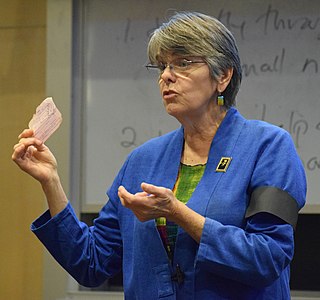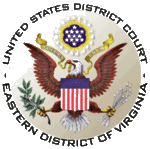Tinker v. Des Moines Independent Community School District, 393 U.S. 503 (1969), was a landmark decision by the United States Supreme Court that recognized the First Amendment rights of students in U.S. public schools. The Tinker test, also known as the "substantial disruption" test, is still used by courts today to determine whether a school's interest to prevent disruption infringes upon students' First Amendment rights. The Court famously opined, "It can hardly be argued that either students or teachers shed their constitutional rights to freedom of speech or expression at the schoolhouse gate."

The United States District Court for the Eastern District of Virginia is one of two United States district courts serving the Commonwealth of Virginia. It has jurisdiction over the Northern Virginia, Hampton Roads, and Richmond metro areas and surrounding locations with courthouses located in Alexandria, Norfolk, Richmond and Newport News.
Bethel School District v. Fraser, 478 U.S. 675 (1986), was a landmark decision of the Supreme Court of the United States in which the Court upheld the suspension of a high school student who delivered a sexually suggestive speech at a school assembly. The case involved free speech in public schools.

Board of Education, Island Trees Union Free School District No. 26 v. Pico, 457 U.S. 853 (1982), was a landmark case in which the United States Supreme Court split on the First Amendment issue of local school boards removing library books from junior high schools and high schools. Four Justices ruled that it was unconstitutional, four Justices concluded the contrary, and one Justice concluded that the court need not decide the question on the merits. Pico was the first Supreme Court case to consider the right to receive information in a library setting under the First Amendment, but the court's fractured plurality decision left the scope of this right unclear.

Richard George Kopf is a senior United States district judge of the United States District Court for the District of Nebraska.
Virginia State Pharmacy Board v. Virginia Citizens Consumer Council, 425 U.S. 748 (1976), was a case in which the United States Supreme Court held that a state could not limit pharmacists' right to provide information about prescription drug prices. This was an important case in determining the application of the First Amendment to commercial speech.
Morse v. Frederick, 551 U.S. 393 (2007), is a United States Supreme Court case where the Court held, 5–4, that the First Amendment does not prevent educators from prohibiting or punishing student speech that is reasonably viewed as promoting illegal drug use.

Desilets v. Clearview Regional Board of Education, 137 N.J. 585 (1994), was a New Jersey Supreme Court decision that held that public school curricular student newspapers that have not been established as forums for student expression are subject to a lower level of First Amendment protection than independent student expression or newspapers established as forums for student expression.

In Guiles v. Marineau, 461 F.3d 320, cert. denied by 127 S.Ct. 3054 (2007), the U.S. Court of Appeals for the Second Circuit held that the First and Fourteenth Amendments to the Constitution of the United States protect the right of a student in the public schools to wear a shirt insulting the President of the United States and depicting images relating to drugs and alcohol.
Robert George Doumar was a United States district judge of the United States District Court for the Eastern District of Virginia.
Charles Sterling Hutcheson was a United States district judge of the United States District Court for the Eastern District of Virginia.

The American Foundation for Equal Rights (AFER) was a nonprofit organization active in the United States from 2009 through 2015. The organization was established to support the plaintiffs in Hollingsworth v. Perry, a federal lawsuit challenging California's Proposition 8 under the Due Process and Equal Protection Clauses of the Fourteenth Amendment to the United States Constitution. AFER retained former United States Solicitor General Theodore B. Olson and David Boies to lead the legal team representing the plaintiffs challenging Proposition 8.
The issue of school speech or curricular speech as it relates to the First Amendment to the United States Constitution has been the center of controversy and litigation since the mid-20th century. The First Amendment's guarantee of freedom of speech applies to students in the public schools. In the landmark decision Tinker v. Des Moines Independent Community School District, the U.S. Supreme Court formally recognized that students do not "shed their constitutional rights to freedom of speech or expression at the schoolhouse gate".
The substantial disruption test is a criterion set forth by the United States Supreme Court, in the leading case of Tinker v. Des Moines Independent Community School District, 393 U.S. 503 (1969). The test is used to determine whether an act by a U.S. public school official has abridged a student's constitutionally protected First Amendment rights of free speech.

Mary Beth Tinker is an American free speech activist known for her role in the 1969 Tinker v. Des Moines Independent Community School District Supreme Court case, which ruled that Warren Harding Junior High School could not punish her for wearing a black armband in school in support of a truce in the Vietnam War. The case set a precedent for student speech in schools.
The censorship of student media in the United States is the suppression of student-run news operations' free speech by school administrative bodies, typically state schools. This consists of schools using their authority to control the funding and distribution of publications, taking down articles, and preventing distribution. Some forms of student media censorship extend to expression not funded by or under the official auspices of the school system or college.
Hazelwood School District et al. v. Kuhlmeier et al., 484 U.S. 260 (1988), was a landmark decision by the Supreme Court of the United States which held, in a 5–3 decision, that student speech in a school-sponsored student newspaper at a public high school could be censored by school officials without a violation of First Amendment rights if the school's actions were "reasonably related" to a legitimate pedagogical concern.
Mahanoy Area School District v. B.L., 594 U.S. 180 (2021), was a United States Supreme Court case involving the ability of schools to regulate student speech made off-campus, including speech made on social media. The case challenged past interpretations of Tinker v. Des Moines Independent Community School District and Bethel School District v. Fraser in light of online communications.

Kowalski v. Berkeley County Schools, 652 F.3d 565 (2011), was a freedom of speech case of the United States Court of Appeals for the Fourth Circuit over the online speech of a public school student. The appeals court affirmed the decision of the district court that the student's suspension for online harassment of a fellow student was constitutional.









